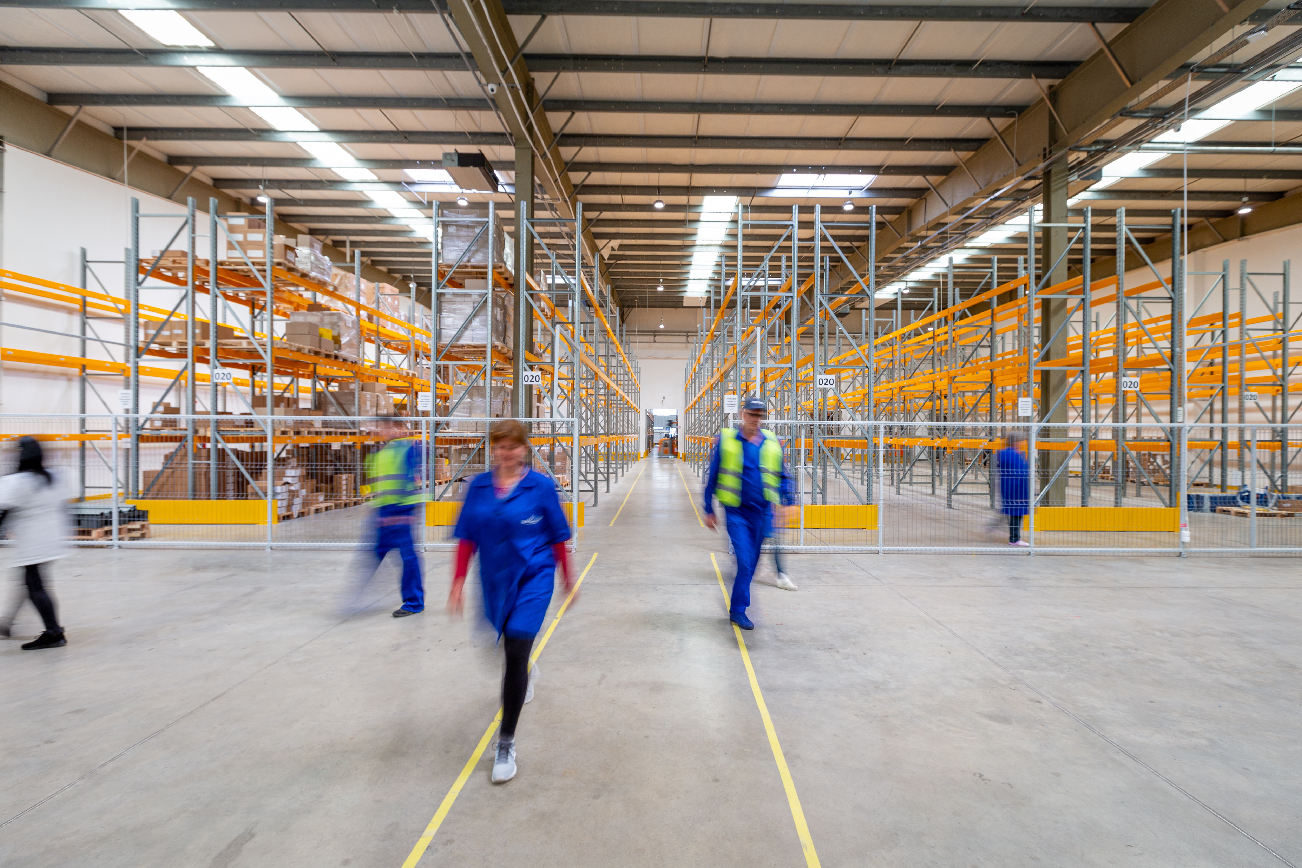Tag: Retail
The future of online retail is just beginning to unfold. We’ve seen the introduction and evolution of e-commerce, and now we’re seeing a new wave: Artificial Intelligence.
The rise of AI has been meteoric in recent years thanks to an explosion in data collection and processing power, as well as improved algorithms for machine learning.
This trend will only continue as our reliance on technology increases and more businesses turn towards digital solutions such as artificial intelligence (AI) to improve their operations.
However, for this article, let’s discover the magic that takes place when AI and e-commerce meet.
What is e-commerce?


E-commerce is a blanket term that encompasses digital stores. It refers to the process of selling products or services over an electronic network. The most common type of e-commerce is a business that sells goods through a website.
E-commerce is booming. Online retail sales worldwide increased from 1,3 trillion in 2014 to 4,8 trillion in 2021. In fact, more than 79% of Americans have shopped online at some point during their lifetime.
In the beginning, people were skeptical about e-commerce because when you wanted to purchase something online, there was no guarantee that the price would be good or the product wouldn’t arrive broken.
But in recent years, because of new safeguards like an easy return policy and customer service, people have started trusting e-commerce platforms more and more.
Many sellers also offer discounts to incentivize purchases on their sites. Plus, they can reach more customers than it’s ever been possible for brick-and-mortar stores.
This brings us back to another factor that made e-commerce so popular: convenience!
The convenience of the customer is always the main priority for an e-commerce company. Customers can purchase anything they need at any time, day or night, without spending additional money on gas just to stop by a store.
When looking for a certain item, online shoppers don’t need to leave their home or office – they just open up their laptop or mobile device and place an order.
Additionally, since it only takes seconds to purchase an item online instead of waiting in line at a store just to buy that one thing, e-commerce sites are able to offer sales and promotions more often than traditional brick-and-mortar chains.
What is AI?
AI is a branch of computer science that studies how to make computers do the things that would require intelligence if done by humans. It’s a hot topic in all fields, from healthcare and education to business and law.
AI has infiltrated every industry and is here to stay.
It’s hard to imagine a future without AI, as it will continue to rapidly grow in importance across all industries.
There are several reasons for this growth:
- The availability of big data
- Advances in machine learning technologies
- Increased focus on customer experience
- Need for automation
AI stands poised to have a significant impact on how people work and live their lives – even if they don’t know it yet.
AI in E-commerce
This rapidly advancing technology has had some significant impacts on the e-commerce business.
One of these changes is how AI can be used to improve customer interactions and streamline business processes, which will lead to an optimized customer experience on and off their website.
The benefits of gaining insights from the collection and analysis of customer data can be further enhanced with the help of artificial intelligence to tailor e-commerce services to the tastes and interests of each individual customer.
With the help of artificial intelligence and data collected from both the business and its customers, today’s online retailers make better decisions by using it to more accurately predict future outcomes and adjust operations accordingly.
Let’s find out more about some of the benefits of AI in the eCommerce industry:
1. AI-driven Site Search for eCommerce


Site search is one of the most valuable tools available to online retailers.
It helps customers find, compare, and purchase products quickly and easily on an e-commerce site—and it’s also a key factor in driving conversion rates for online retailers.
That is why it is important for e-commerce to not only ensure high-quality search, but also to go one step further and provide a great customer experience. How exactly?
The answer lies in artificial intelligence (AI), as it takes the entire search experience to the next level.
Instead of giving shoppers basic and dull search results, with the help of artificial intelligence companies can implement:
- Self-learning search that develops with the interaction of each customer and returns results for specific and long-tail keywords.
- Visual search that gives buyers the opportunity to find products similar to the ones in the uploaded image.
- Voice search that has speech recognition and will allow your customers to find products without typing the keywords.
2. AI-driven eCommerce personalization
One of the ways that AI can help today’s online retailers deliver an optimized customer experience and ensure customer loyalty is through its ability to personalize e-commerce services.
Based on users’ interactions with the e-commerce platform, like past purchases or browsing history, AI can recommend items the user might be interested in.
For example, if some of your previous searches on Amazon have been for dog collars, your product recommendations the next time you visit the website are more likely to be about pet products.
This is because the retail giant knows that your interest is currently related to pet products and therefore provides relevant suggestions.
This not only improves the entire customer experience but also helps businesses drive sales.
E-commerce companies implement these personalization techniques at various points of contact with customers, not just on websites.
The next time you receive an email newsletter from your favorite retailer, which includes the products you’ve been looking for, don’t worry, it’s just AI-powered automation doing its job.
3. AI-powered chatbots
Chatbots are a type of artificial intelligence that allows customers to interact with businesses through the use of text or voice messages.
This technology has grown leaps and bounds in recent years thanks to advancements in artificial intelligence (AI), natural language processing (NLP) and machine learning algorithms that have enabled chatbots to understand human speech better than ever before -and respond accordingly with relevant information.
As Chatbots made significant advancements in recent years, they have become increasingly popular for online retailers.
Chatbots help e-commerce businesses by responding to customer inquiries about products and services, as well as providing feedback on orders.
Buyers don’t have to wait for a human service agent to tell them the status of their order, product availability, the company’s return policy or recommendations, they simply connect with a chatbot and receive a response in a matter of seconds.
As companies continue to invest in chatbot technology for their e-commerce websites, these virtual assistants will only get better at understanding what a shopper wants from them.
We are already seeing progress with virtual assistants such as Siri or Alexa. In the beginning, people were having fun with them by asking questions about anything from the weather to what to wear on Wednesday night.
However, today, technologies like Alexa can perform more complicated tasks, like ordering straight from amazon and requiring nothing more than a simple voice command.
The future of chatbot technology looks bright because it presents an opportunity for brands looking for more creative ways to interact with customers online while also closing the gap between customers and businesses.
Chatbots can offer a faster and more convenient way to conduct certain transactions and provide the same level of customer service as a human representative or even surpass it by providing benefits like 24/7 availability.
4. AI-powered product pricing


Retailers are always trying to find ways to optimize their business processes and meet the ever-changing needs of their customers.
For both online retailers and traditional brick-and-mortar stores, this means adding new products to your inventory, adjusting pricing strategy based on demand, and identifying trends that will influence how to market certain items.
These decisions can be difficult for even the most experienced retailer because they involve predicting the future.
While no one has a crystal ball, AI is able to help eCommerce businesses make better predictions by using collected data about past sales patterns as well as information gleaned from social media conversations about trending topics.
Once all this data has been analyzed, AI can offer retailers to adjust prices to optimize margins and increase sales possibilities. This is also called dynamic pricing.
Dynamic pricing is a retail strategy where the price of an item varies based on customer demand. A retailer might have two different prices for one item, or change the price hourly depending on how many units they currently have in stock.
With sophisticated technology available like artificial intelligence, dynamic pricing has become even more popular among retailers who want to offer customers lower prices during low periods of demand (think “Black Friday” sales) while still generating revenue
With sophisticated technology like artificial intelligence, dynamic pricing has become even more popular with retailers. It gives the eCommerce store the ability to:
- Offer customers lower prices during periods of low demand (think “Black Friday” sales) while still generating revenue.
- Target consumers with a higher willingness to pay and maximize profits.
5. AI-powered customer churn prevention
For e-commerce, customer churn is the process of customers opting out of an eCommerce platform or service.
Customer churn can be caused by a customer’s dissatisfaction with the quality of goods, their inability to find what they are looking for on the website, or most importantly because they have found better alternatives elsewhere.
When it comes to online retail, this means that once you’ve lost a customer to another company’s website or store, there is no guarantee that they will return after finding out about your competitor’s offers and discounts.
Typically businesses focus more on retaining current customers rather than trying to gain new ones;
This is because if customer churn is left unchecked, over time these losses can lead to significant penalties in revenue and profits.
One way retailers combat this issue is through AI-powered customer churn prevention.
With the help of powerful tools like predictive analytics, online retailers can identify which customers are likely to churn.
Here’s how predictive analytics works: it uses business data about past events (i.e., customer behavior) combined with data about current conditions (i.e., website traffic, user activity, etc.) to make predictions about future outcomes (i.e., churn).
This is done by analyzing customer behavior and activity. If the user has not logged in for a long time or has not placed an order, this may be a prerequisite for a churn.
AI solutions automate this entire process by not only identifying those who are likely to drop out, but also engaging them with promotions like discounts to avoid loss.
Thanks to such automation, e-commerce stores can focus their efforts on retaining these valuable customers and take steps to prevent them from leaving in the first place.
The future of AI-driven eCommerce


One of the promising technology that is likely to merge with eCommerce is Virtual Reality (VR).
VR is a computer-generated simulation of a three-dimensional image or environment that can be interacted with in a seemingly physical way by a person using special electronic equipment, such as goggles.
Virtual Reality has been described as like “being there” and gives one the feeling of being in another place inside one’s head.
Virtual reality became popular mainly from video games and entertainment media but it looks very promising for e-commerce and retailers too.
The future of e-commerce is all about immersive experiences. The best way to get customers engaged and excited about a product, the more likely they are to buy it.
One way that retailers can do this is by using virtual reality (VR) technology for their online stores. VR has the potential to allow consumers to virtually “try on” clothes or shoes before buying them or even take a tour of a store without leaving home.
Mass usage of such technology in e-commerce should be no surprise because online retailers are already using augmented reality.
For example, Amazon introduced AR View in 2017 which allows customers to get a virtual preview of the products they are considering purchasing. For instance, you can use this tool to see if that new phone case will fit your device before buying it or seeing how that couch you´ve been eyeing for so long will fit in your living room.
These AR applications allow users to see what their homes, surroundings, or themselves would look like with various pieces of products such as clothing, furniture, or appliances.
This experience will be further expanded with fully emerging users with the help of virtual reality where shoppers can visit stores without leaving their homes.
Conclusion
The future of online retail will be defined by AI. No matter how you feel about the technology, it’s not something that can be ignored or avoided – so get ready to embrace it.
You don’t have to become an expert in order for this shift to take place; instead, focus on staying current with new developments and utilizing AI-powered tools where appropriate. As long as you’re willing to put in a little work up front, there are plenty of ways that AI could help your business thrive tomorrow!
The retail industry is evolving. And AI is at the forefront of this evolution. Retailers are using artificial intelligence to create innovative new products, solve problems and increase customer satisfaction.
In the retail industry, artificial intelligence is not a new concept. In fact, big data and machine learning have been essential to retailers for years now. AI has been used by many different retailers in order to optimize operations and increase revenues
From Walmart’s virtual shopping assistant in its app to Amazon’s Alexa platform, there are many ways that AI can help retailers improve their operations and profits.
AI has already begun improving the way companies like Nike, Microsoft and Walmart manage their supply chains, reduce labor costs or offer shoppers with personalized product recommendations when they log on to the company website.
This article will take a look at how different famous retail companies use artificial intelligence in their operations, what benefits does it have to offer for both customers and employees alike not just today but also tomorrow!
What is the meaning of the retail sector?
The retail sector is the economic sector involved in the sale of goods to consumers. This includes any business which provides services or products. It also encompasses wholesale trade and storage as well as rental services that are typically offered by retailers.
What is Artificial Intelligence?
Artificial Intelligence is a field of computer science and engineering that deals with computationally intelligent agents, such as self-driving cars or self-learning robots.
An artificial intelligence system learns from general knowledge about concepts in the real world through data mining and pattern recognition. In short, AI helps to augment human decision-making when it can’t be done without humans.
Walmart


Walmart is a multinational corporation that operates a chain of hypermarkets, discount department stores and grocery stores. As of 2019, Walmart operated 11,847 stores.
Walmart uses AI to manage inventory and reduce labor costs.
Walmart has been using AI for some time now in order to manage its inventories. For example, Walmart uses machine learning software so it can monitor its supply chain and identify when there is a need to restock certain products on the shelves at specific stores. The company also analyzes past sales data so that it can predict what will sell and when, and then uses that information to ensure the right products are always available for its customers.
Amazon
Amazon is American electronic commerce and cloud computing company with headquarters in Seattle, Washington. It is the largest internet-based retailer in the world by total sales and market capitalization.
AI has been used by Amazon for years now. However, only recently the company started using artificial intelligence in order to create innovative new products such as Amazon Alexa.
This AI platform was introduced in 2014 and has since become one of the company’s biggest assets.
It can be found on all kinds of devices – from speakers to microwaves – that are connected through an app that makes it possible to order Amazon products, play music or even get news updates.
Alibaba Group
Alibaba Group is one of the most comprehensive business-to-commerce companies in the world. It was founded by Jack Ma and Eric Zhang in 1999.
Aside from being a direct sales platform to sell their products, Alibaba also has offline stores all over China. From retailing to logistics to payment processing power, Alibaba can do it all!
With the help of AI, Alibaba group is able to optimize its operations and increase revenues.
One way they do this is by writing thousands of product descriptions in seconds. How does the company do it? With the help of AI, of course.
Alibaba doesn’t have to pay individual content writers for compelling product descriptions; Instead, they turn to artificial intelligence technologies for help and not only cut costs, but also cut time for content production.
Alibaba has been using AI in order to help with logistics, product recommendations and even forecasting demand levels based on weather patterns for its offline stores so that they know how much inventory should be kept at each location.
Carrefour


Carrefour, founded in France in 1959 is one of the world’s largest retail groups. It runs a global network of hypermarkets, supermarkets, and convenience stores, with 12,225 outlets in more than 30 nations as of January 2021.
Carrefour started using AI in order to help with inventory management and optimizing its supply chain processes. The retailer also created an app powered by AI which will be able to offer customers a checkout-free shopping experience.
However, the company decided to include futuristic ways of utilizing artificial intelligence such as having robots working at their stores. These robots help with stock management by patrolling and monitoring if the shelves are full.
Conclusion
Artificial intelligence has been around for a while now and it’s already impacting businesses in tangible ways.
Whether you need help with inventory management, optimizing your supply chain processes or even creating innovative new products like Amazon Alexa, AI is here to help.
When companies use AI they are able to cut costs and time needed for content production by turning instead to artificial intelligence technologies such as writing thousands of product descriptions at the same time.
If this sounds interesting and captivating enough for you let us know so we can start helping you get on top of things today.
Did you know that the retail sector is one of the most competitive industries? Retail industry growth by 2023 is expected to reach $ 29.763 trillion.
When we talk about the retail industry, we mean a vast and complex sector that comprises of many different types of businesses, from small stores to large chains. The companies in these sectors are some of the most popular ones like Walmart, Amazon, Costco, etc.
In order to thrive in this competitive environment, these businesses need to continuously adopt new technologies and innovate their business models.
With all of this in mind, it’s no wonder that retailers are fighting a fierce battle with each other to attract new customers.
Predictive analytics has proven to be one of the best tools to gain the desired competitive advantage for retailers and has been increasingly implemented since the discovery of its benefits for businesses.
In this article, we’ll delve into the reasons that make predictive analytics a go-to tool to drive retail sales.
Demand forecasting


Our calendars are full of special events and dates that are associated with different holiday offers. Customers often wait patiently for these days to get their hands on the desired products for less money.
This increase in sales of specific products often leads to a shortage of stocks, causing retailers to lose additional profits. With a wide range of factors such as holiday sales, trends, etc., predictive analytics uses its statistical algorithm and machine learning techniques to predict future demand for certain products with high precision.
It is important to understand that predictive analytics does not provide a forecast based on past sales, but rather includes other influencers who may also have an impact on demand.
Forecasting customer demand not by instinct, but by predictive analytics, ultimately helps retailers properly prepare for holiday events and ensure that supply matches demand. In this way, customers are satisfied due to the increased availability of the desired product and retailers are happy as they make more sales.
Customer behavior prediction
It is a well-known fact that understanding customer behavior is vital for businesses as it also clarifies what makes a consumer use a product/service. That is why companies invest a lot of resources in customer behavior analysis tools such as google analytics, heat maps, and surveys.
But can you imagine if companies could not only know the current patterns of customer behavior but also predict them? Well, it is not necessary to imagine it because this is already a reality.
We already talked about how predictive analytics forecasts customer demands on certain products. However, this technology goes one step further and can even predict which customers are likely to leave your business.
With the availability of big data, smart algorithms can compare the behavior of specific customers with that of the customer who churned and based on that information, warn a business of a potential loss.
In this way, companies can send promotional campaigns to retain customers with a high probability of abandonment. Such predictions are invaluable, as acquiring a new customer can cost 5x more than retaining an existing customer.
Predictive maintenance


Today, in the retail sector, many processes such as package collection and allocation are automated. In fact, intelligent automation is one of the most important factors for reducing costs and increasing efficiency.
The daily operations of many retailers depend on the flawless functioning of this automated equipment. However, it is impossible for equipment to function flawlessly and not require maintenance from time to time.
This is not an easy problem and causes big problems for retailers, ultimately resulting in dissatisfied customers and huge expenses.
While it is challenging to ensure permanent good health of equipment, it is possible to predict the probability of failure and be proactive rather than reactive.
By collecting data with the help of IoT on equipment health, production data, ambient temperature, etc., intelligent algorithms can predict the probability of equipment failure, resulting in:
Conclusion
In an industry as competitive as retail, predictive analytics is a powerful tool for companies that ensures a competitive advantage and helps them make sense of structured and unstructured data and turn it into actionable information.
Schedule a free consultation call with our AI expert and let’s discuss how our custom solution can help your business overcome challenges and improve performance.















